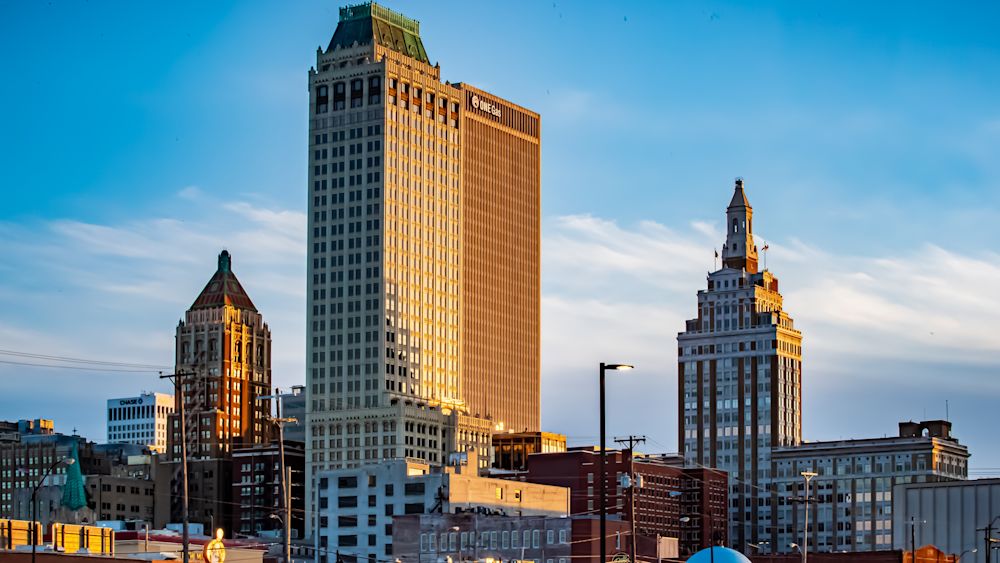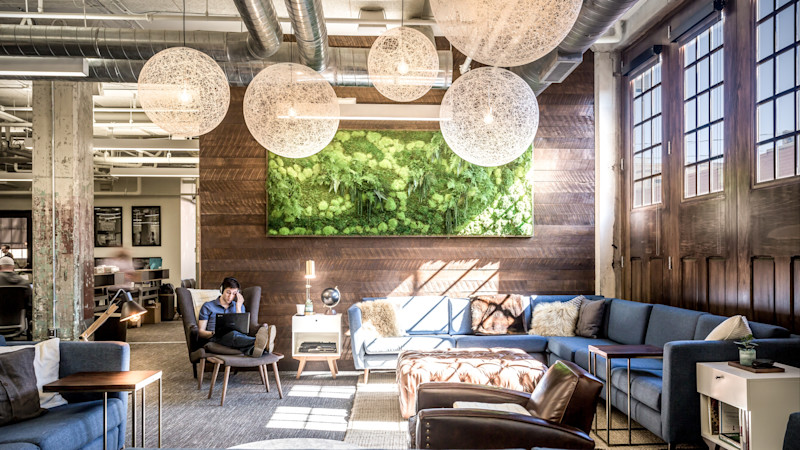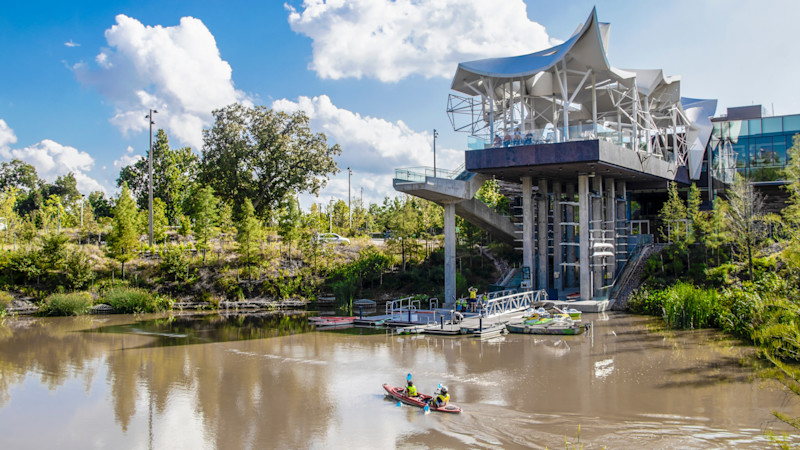- Iterate
- Meet The Team
- Tulsa May Just Be The Next Big Startup City
Would you move to Tulsa, Oklahoma for $10,000? How long would you stay? Tulsa Remote’s incentive program launched in 2018 to bring new talent and life into the city, and it’s paying off.

Mike Bodulow and Megan Villanueva never thought they’d find themselves in Oklahoma, let alone settling down and buying a home there. The two hail from the Bay Area and were living in Washington D.C. for Megan’s job until December 2018 when the two wanted a change of pace.
“We just moved across the country. The last thing we wanted to do was move right back to California,” Mike says. “We kind of said, what else is out there? Where else do we want to live?”
He thought back to a conversation with a colleague from Megan’s old company, who suggested the couple move to Tulsa, Oklahoma.
“I said, ‘You're crazy. I've never even been to Tulsa,’” Mike says. “But lo and behold, we started looking at places to live, and the Tulsa remote program popped up.”
Two years ago, Tulsa Remote was launched as a recruitment initiative to attract new and diverse talent to Oklahoma’s second-largest city. The program offers a $10,000 grant to full-time remote workers who move to Tulsa, along with a free membership to a coworking space and plenty of other community-building activities.
Tulsa also happens to be the hometown of billionaire George B. Kaiser, heir of the billion-dollar Kaiser-Francis Oil Company and chairman of the BOK Financial Corporation. Kaiser has pledged to contribute his remaining net worth to his foundation, the George Kaiser Family Foundation, and has given $4 billion in funds to his charities so far.
His philanthropic efforts can be seen all over Tulsa, from the 66-acre park the Gathering Place (the largest public park built with private funds), to the Tulsa Remote community, which is directly supported by his foundation.
Tulsa Remote first launched in November 2018, and Community Manager Grant Bumgarner says they were “shocked” at how many initial applications they received — over 10,000. When the pandemic started, Tulsa Remote saw a 300% increase in applications to the program, with 380 new members joining by the end of 2020.
There are now over 600 active members and alumni of the Tulsa Remote program with people moving from every corner of the country on a rolling basis. California, New York, and Texas make up a bulk of the participants, but others come from as far as Alaska and as near as Arkansas.

Mike and Megan were accepted to the program as part of the first cohort of Tulsa transplants. They moved in June of 2019, and despite protestations and concerns from family members back on the coast, haven’t looked back.
“The plan was to come rent for a year and if we didn’t like it we would leave,” Megan says. “Within the first six months it was like, we should probably buy a house.”
The couple is celebrating their one-year anniversary of buying their house in Tulsa this month.
Mike and Megan illustrate just how high the retention rate is for this program. Of the 600 active participants and alumni, 93% of people have stayed past the one-year program minimum, many of whom are looking to settle more permanently in the area. More than 130 homes have been purchased by members.
As the number of qualified applicants keeps going up, the program has jumped on its moment to try and get people to stay. In February 2021, Tulsa Remote changed the rules around its $10,000 grant by allowing participants to use it directly to buy a home.
“For folks who work remotely, we want them to come here and then stay here,” Tulsa Remote Community Manager Grant Bumgarner says. “That's why we're doing the homeownership initiative to let people know, hey, Tulsa is a great city. It's a place where you can afford to set down roots, build a family, and you don't have to sacrifice any of the things you like to do."
Home affordability is one of the major draws for participants to stay in the area. The median home price in Tulsa as of January is $188,000. Mike and Megan were able to buy their 1,400 sq ft home for a little under $198,000, something they couldn’t begin to dream of back in San Francisco or D.C.
But for Mike, it goes deeper than just the price of his home and the space he gets for it. He says the ease of living in Tulsa is really what changed his perception of the city. The couple was able to join a waitlist at a local Walmart and get vaccinated, even as Phase 3 and 4 eligible candidates, something Megan says she also could never dream of happening in D.C. or the West Coast just because of the number of people.
“I waste so little time driving places, standing in lines, doing all the things I hated about living in a city thinking, ‘Oh well, San Francisco is the only city in the world with a cool coffee shop where I can sit down but unfortunately have to wait an hour to get to see,’” Mike says. “It's not true. There are really cool coffee shops in every stupid city in this country.”

Forget Austin and Miami - Tulsa is poised to emerge as an underdog for one of the U.S’s next big startup cities. In a state historically known for its deep roots in the oil, gas, and farming sectors, part of Tulsa Remote’s goal is to bring the city and its economy out of the last century and into the future.
Over 40% of Tulsa Remote participants work in the tech industry, and with help from newly established “work from anywhere” policies at the major tech companies, the program is welcoming employees from the likes of Google, Facebook, Apple, and GitLab.
Tulsa’s efforts to get on the map are starting to gain attention. In 2020, Tesla selected Tulsa as one of two finalists for its new electric car factory, the biggest one they’ve built to date. The EV company eventually settled on Austin, but Grant, also a lifelong Oklahoma native, says it’s “crazy” Tulsa was even being considered. He says it's a testimony to how much the city has innovated its tech sector in the past few years.
Soon after moving to Oklahoma, Megan got a job as a Product Manager at Asemio, a Tulsa-based tech consulting firm with a national reach.
“It's kind of ironic that I broke my way into tech in Tulsa, Oklahoma,” Megan says. “It’s actually a really growing industry, very innovative. I think it’s a really great place to be for entrepreneurs who are interested.”
The relocation program also has forged partnerships with tech incubators like the Holberton School, a San Francisco-based coding academy that will train 300 software engineers a year at the Tulsa Campus once it reaches its full capacity. There’s also an emerging VC scene in Tulsa, with new firms like mission-driven Atento Capital that are looking to invest in companies that grow jobs in the city.

Every participant The Org spoke to emphatically agreed that it is the people above all else that committed them to stay.
“People talk a lot about the $10,000 relocation grant and that'll grab a headline, it has some sex appeal to it,” said Dustin Baker, a Tulsa Remote member who moved his family of six from Texas in July 2020. “But that's really a rounding error for somebody moving from the East Coast or the West Coast to Tulsa. It might take the bite off of the moving expense, but the real value to me is the robust community.”
Engineering that authentic sense of community has been paramount to Tulsa Remote’s success. Community managers like Grant are hired by the foundation and are responsible for putting on events like happy hours, holiday parties, speaker series, and trivia nights. The strategy is to forge real connections between participants and the city to cultivate a sense of community, and it seems to be working. The Tulsa Remote slack group has over 150 channels in it, each seemingly producing organic interactions and friendships that Dustin, Mike, and Megan speak fondly of.
“Any town can decide we're going to pay people $10,000 to come live here,” Dustin says. “What they can't do is create a community and a group of people that have the resources [for a] community to flourish and thrive. For whatever reason that's been incubated in Tulsa, I think for a long time.”
Create your own free org chart today!
Show off your great team with a public org chart. Build a culture of recognition, get more exposure, attract new customers, and highlight existing talent to attract more great talent. Click here to get started for free today.
In this article


The ORG helps
you hire great
candidates
Free to use – try today